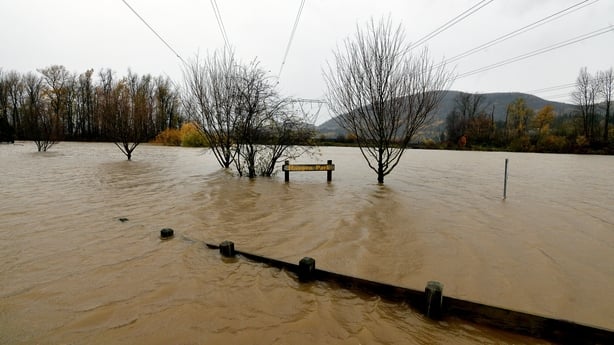At least one person has died in torrential rains that forced thousands in western Canada to evacuate their homes and trapped motorists in mudslides, according to federal police.
Search and rescue teams recovered the body of a woman from a mudslide near Lillooet, 250km north of Vancouver, the Royal Canadian Mounted Police said.
Staff Sergeant Janelle Shoihet added that investigators have received two missing person reports, but that they believe "there may have been other occupied vehicles that were lost in the slide".
"The total number of people and vehicles unaccounted for has not been confirmed," she said.
Mudslides, rocks and debris washed away several highways leading to Vancouver, trapping hundreds of motorists who were rescued by military helicopters by nightfall yesterday.
Local television showed video footage of the Trans Canada highway connecting the coastal city to the rest of the country inundated. A bridge was also washed out.

Other routes have also been closed, according to traffic information service Drive BC, which said on Twitter: "Highways are closed until further notice".
Environment Canada said up to 250 millimetres of rain - what the region normally gets in a month - fell on Sunday and yesterday in and around Vancouver, which was also hit last week by a rare tornado.
A look from a flyover of #BCHwy1 at Tank Hill near Lytton and Nicomen.
— BC Transportation (@TranBC) November 15, 2021
For the latest #BCStorm travel info, check @DriveBC's website: https://t.co/0sq39Ad5WN#TransCanadaHighway pic.twitter.com/N4zVto5vNK
Emergency centres were set up for displaced residents.
"Please stay safe," Prime Minister Justin Trudeau said in a Twitter message.
"We're ready to provide whatever assistance is needed as you deal with and recover from the flooding and this extreme weather," he said.
To the people of Merritt, and to all British Columbians affected by the flooding: please stay safe. And as Minister Blair said, we're ready to provide whatever assistance is needed as you deal with and recover from the flooding and this extreme weather. We’re here for you. https://t.co/FqyCeSAVwD
— Justin Trudeau (@JustinTrudeau) November 15, 2021
Construction of the Trans Mountain pipeline connecting the Alberta oil sands to the Pacific coast was also paused, a company spokesperson said, "due to widespread flooding and debris flows."
#BChwy99 near #Lillooet is closed due to a mudslide between Lil'wat Pl and Texas Creek Rd for 44.6 km. Assessment in progress.
— BC Transportation (@TranBC) November 15, 2021
Please check https://t.co/NCVlkn102s for updates. pic.twitter.com/UAJcfR9KaH
Meteorologist Tyler Hamilton commented on social media that the city of Abbotsford, outside Vancouver, in the past 140 days had experienced both its warmest and wettest days ever.
A cyclist battles strong winds in Vancouver, close to where a huge barge became unmoored and crashed into the city's seawall. Heavy rain has brought flooding to many areas along Canada's Pacific coast | https://t.co/ZuptpaIZpt pic.twitter.com/JxlaYmxaR0
— RTÉ News (@rtenews) November 16, 2021
The extreme weather comes after British Columbia suffered record-high temperatures over the summer that killed more than 500 people, as well as wildfires that destroyed a town.

